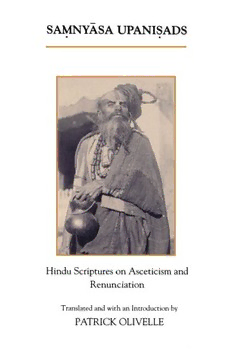
The Samnyasa Upanisads: Hindu Scriptures on Asceticism and Renunciation PDF
Preview The Samnyasa Upanisads: Hindu Scriptures on Asceticism and Renunciation
S A M N Y A SA U P A N I S A DS This page intentionally left blank This page intentionally left blank SAMNYASA U P A N I S A DS Hindu Scriptures on Asceticism and Renunciation Translated with Introduction and Notes by PATRICK OLIVELLE New York Oxford OXFORD UNIVERSITY PRESS 1992 Oxford University Press Oxford New York Toronto Delhi Bombay Calcutta Madras Karachi Petaling Jaya Singapore Hong Kong Tokyo Nairobi Dar es Salaam Cape Town Melbourne Auckland and associated companies in Berlin Ibadan Copyright © 1992 by Oxford University Press, Inc. Published by Oxford University Press, Inc. 200 Madison Avenue, New York, NY 10016 Oxford is a registered trademark of Oxford University Press All rights reserved. No part of this publication may be reproduced, stored in a retrieval system, or transmitted, in any form or by any means, electronic, mechanical, photocopying, recording or otherwise, without the prior permission of the publisher. Library of Congress Cataloging-in-Publication Data Upanishads. English. Selections. Samnyasa Upanisads : Hindu scriptures on asceticism and renunciation translated with introduction and notes by Patrick Olivelle. p. cm. Translated from Sanskrit. Includes bibliographical references and index. ISBN 0-19-507044-5 ISBN 0-19-507045-3 (pbk.) i. Sannyasi—Early works to 1800. 2. Asceticism—Hinduism—Early works to 1800. I. Olivelle, Patrick. II. Title. BLi 124.54. £5 1992 294.5'9218—dc2O 9I-H353 135798642 Printed in the United States of America on acid-free paper For Meera prajam anu prajayase tad u te martydmYtam In your offspring you are born again; That, O mortal, is your immortality. TB 1.5.5.6 This page intentionally left blank Preface Now that this task is complete, it is my duty to pay my debts to individuals and institutions who made it possible; would that all my duties were as pleasant! The Department of Religious Studies and the Office for Research of Indiana University at Bloomington supported this project with a variety of grants. Few institutions provide a better environment for personal growth and scholarly endeavors. My gratitude is heightened as I prepare to leave them after a seventeen-year association to join the University of Texas at Austin. The Wolfson College of Oxford University provided unpar- alleled resources and a beautiful environment during 1977—1978 and 1981 — 1982 to conduct research. The Bhandarkar Oriental Research Institute in Poona and the Theosophical Society in Adyar, Madras, were generous in accommodating even my most unreasonable requests. Research at Oxford and in India was supported by generous grants from the National Endowment for the Humanities, the Smithsonian Institution, and the American Institute of Indian Studies. We owe an intellectual debt to all those from whose labors we profit. They are too numerous to name; some of them will appear frequently in the footnotes and the bibliography. To two of them, however, I owe a special debt of gratitude. This VII Preface translation would have been much poorer but for the many works of Professor Joachim Friedrich Sprockhoff listed in the bibliography. Over innumerable cups of tea at his home I learned a great deal from the late Dr. V. V. Bhide—about the Vedic ritual, about the intricacies of Mimamsa exegesis, but most of all about the way Brahmin pandits think and write. His un- timely death is a great loss to Indological studies. Mary Jane Gormley read all the translations and helped me with more than commas and colons. Ross Vemeer assisted me in compiling the index. Anne Feldhaus read an early draft of the introduction; it is the better for it. Cynthia Read's patience is matched only by that of my wife, Suman; to both a heartfelt thank you. To Meera this book is dedicated; contrary to Vedic theologians, she has proven that a daughter does indeed bring unsurpassable delight to a father and is "a light in the highest heaven." Bloomington, Ind. P.O. April 1991 viii Contents Note on the Translations, xiii INTRODUCTION 1. The Samnyasa Upanisads, 3 1.1 Editions, Translations, and Studies, 6 1.2 Dates, 8 1.3 Context: Brahmanical Literature on Renunciation, n 2. Renunciation and Society: The Inner Conflict of Tradition, 19 2. i Vedic Theology: Sacrifice and Marriage, 23 2.2 Socioeconomic Changes in Sixth-Century India, 29 2.3 Rival Views of Religious Life, 33 2.4 The Emergence of a New World, 39 2.5 The Householder and the Celibate, 42 2.6 When Two Worlds Meet: Conflict and Compromise, 46 IX
